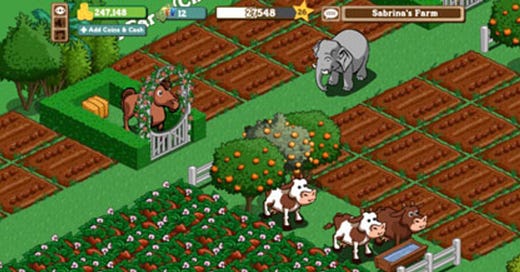Remembering Farmville, a Game that Changed It All
Nintendo studied noncustomers to create the blockbuster Wii and all went well until blue ocean Farmville.
As 2020 drew to a close so did the end of an era; game maker Zynga shut down Farmville, the original massively viral blue ocean game. Let’s take a minute to check out the history of Farmville that traces its roots to the Wii.
Nintendo Needs a Hit
I’ve repeated the story of blue ocean blockbuster Wii so many times I can type it from muscle memory.
Summarizing for those just being reanimated from a deep sleep, Nintendo was a distant third in the console wars. Market leader Sony was releasing the PS3, a console with a proprietary chip so advanced it could steer cruise missiles plus a Blu-ray disk reader. Microsoft was competing vigorously with the Xbox 360, losing about $550 on every $400 console sold.
Nintendo decided to release a new system but could not afford to lose any money on even the first console. Rather than compete, they used blue ocean strategy to study noncustomers and develop the idea of “casual games” — that is, approachable games anybody could play that became more difficult over time.
Specifically, Nintendo studied Tier 3 noncustomers in retirement homes to see what they spent their time doing. The Kyoto firm found the retirees were playing games like Chess or Bridge, games that had relatively simple rules but became maddeningly complex when played against clever opponents.
Nintendo’s Wii was a smashing success outselling the Sony and Microsoft consoles combined for two years, an eternity in the fast-moving world of high-tech. At one point, Nintendo was the highest per-employee grossing company in the world. Everybody wanted a Wii whereas traditional games also wanted a Sony or a Microsoft console.
Driven largely by their focus on casual approachable games, Nintendo launched a blue ocean of gaming.
Until Farmville
By any rational measure, Farmville should’ve been a flop. The “game” — if you can call it that — was ridiculous. People were required to plant virtual crops they needed to then harvest after a certain amount of time to be exchanged for in-game currency. Space out harvesting your crops for too long and they withered, requiring virtually digging them out and replanting them. To plant or harvest crops you’d chose a crop then click on a rectangle of adjacent squares, one after another. In gaming parlance, this is referred to as “grinding,” — requiring brainless no-skill tasks over-and-over to advance.
Players use virtual coins to expand the farm, buy virtual buildings (that had no utility besides aesthetics), or gain access to more crops. Expanding the farm meant more grinding planting and harvesting crops in an effort to build the farm even larger. For those who wanted to go faster — who didn’t want to wait for their crops to mature — people could purchase in-game coins for real coins which is how Farmville owner Zynga earned a living.
Farmville ran on Facebook and relied heavily on community functions. Specifically, players were able to ask their Facebook friends for help with their farms. The more friends that joined in to help, the faster things moved along. This created a naturally viral game — where players advertised to one another via friends networks — but it also quickly became a spammy experience, especially as other game makers copied the functionality and countless game notifications filled the Facebook news feed. Eventually, Facebook made it far harder for game makers to engage in this type of advertising and far easier for users to entirely prohibit the game notices.
The viral method worked. The game shot to the top of the charts for Facebook games in 2009 and, at one point in 2010, Farmville had 83 million active users and 34.5 million daily active users.
There’s a strong argument to be made that Farmville is a knockoff of the wildly successful Farm Town. The evidence seems to support this but, for the purpose of analyzing what makes it a blue ocean game, this unseemly aspect of its origin story isn’t all that important.
Blue Ocean Strategy Analysis
So - what makes Farmville a blue ocean game? Let’s run through a four actions framework exercise thinking about what they eliminated, reduced, raised, and created.
Eliminate
The game eliminated the need for skill. If you can tap, you can play Farmville. There’s also zero buy-in cost. Before Farmville, most games required people to purchase the game. Farmville is entirely free, which was new at the time. Also, the game eliminated the need to install a game; it all ran in a browser.
Reduce
The reward mechanism of achievement was vastly reduced. Remember to show up in time to harvest your virtual crop and you win some more coins. The cost to advance is also reduced in terms of risk. That is, with a traditional game you’d purchase the entire game and risk that it stunk. With Farmville, you purchase small amounts of coins at a time. The purchases can and did often aggregate to as much or more cost than buying the game but it was just a few dollars at a time and you knew, immediately, what you’d receive for the purchase.
Raise
Zynga, or whoever actually made the game, raised the level of creativity. That is, where most games involve a small set of preset screens you do something with (play cards, shoot monsters, etc) with Farmville you design a virtual farm; it actually involves some creativity. Additionally, the reward system unlocked more design options than simply the satisfaction of beating a monster or advancing a level.
Create
Finally, they created the viral part of the game looping friends in to help which also helped it spread. There was also the need to return to the game or suffer a penalty whereas most games were perfectly happy to be ignored when not played.
Back to blue ocean strategy and the Wii
Farmville brought the appeal of Wii games to the masses in a way that didn’t require a proprietary console or even a download and installation. Rather, these casual games were played in web browsers and connected via Facebook.
The game does rely on the Flash plugin from Adobe, antiquated technology now abandoned that, even at its peak, ran poorly and is a perennial security risk. But surely Zynga could have reprogrammed it with newer more modern tech if there was any cost justification to do so. This is a good example of why technology is never a key factor: Flash didn’t matter but the ability to play in a browser — for which there are several better methods — did.
Furthermore, they could also have built traditional iOS and Android games if Farmville would’ve attracted even a fraction of the users it did (at one point they did then withdrew the offering). And, indeed, there is a Farmville 2, Farmville 3, and a few others. But none ever caught on like the original.
Finally, one criticism of blue ocean strategy is that many of the cases we cite did not use the strategic framework. Instead, we study strategic moves — usually, products and services but sometimes also government programs or social movements — to search for patterns. Nothing is actually wrong or even unusual about that though the practice draws critics. However, I’ve been personally told by a senior Zynga employee speaking confidentially that, during their early years, they did use the blue ocean tools and frameworks. However, Zynga eventually lost its way and became a deep red ocean competitor with the predictable chaos that creates.






